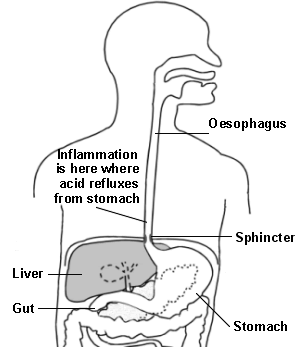Acid reflux is a condition in which acid from the stomach leaks up (refluxes) into the gullet (oesophagus). When we eat, food passes down the gullet into the stomach. Cells in the lining of the stomach make acid and other chemicals which help to digest food. These stomach cells also make mucus which protects them from damage from the acid, however, the cells lining the oesophagus are different and have little protection from the said acid. At the junction between the oesophagus and the stomach there is a circular band of muscle called a sphincter which relaxes to allow food down but then tightens to stop food and acid leaking up (refluxing) into the oesophagus. The sphincter acts like a one way valve but sometimes this does not work effectively.
Heartburn is the main symptom of acid reflux. It is a burning feeling which rises from the abdomen up towards the neck. Remember, although it is known as heartburn it has nothing to do with the heart. Other common symptoms are pain in the upper abdomen or chest, feeling sick, an acidic taste in the mouth, bloating, belching, indigestion, and a burning pain when you swallow hot drinks. These symptoms, like heartburn, tend to come and go and tend to be worse after a meal. Some uncommon symptoms of acid reflux are a persistent cough which occurs especially at night due to the refluxed acid irritating the windpipe, coughs and wheezing, which are symptoms of asthma can sometimes be due to acid reflux and sometimes other mouth and throat symptoms occur, including bad breath, gum disease, sore throat, hoarseness, and the feeling of a lump in the throat. In some cases a severe chest pain can develop which can be mistaken for a heart attack. Eating when you are working, driving, stressed, rushing or emotionally upset can have an impact on your digestion and lead to acid reflux.
due to the refluxed acid irritating the windpipe, coughs and wheezing, which are symptoms of asthma can sometimes be due to acid reflux and sometimes other mouth and throat symptoms occur, including bad breath, gum disease, sore throat, hoarseness, and the feeling of a lump in the throat. In some cases a severe chest pain can develop which can be mistaken for a heart attack. Eating when you are working, driving, stressed, rushing or emotionally upset can have an impact on your digestion and lead to acid reflux.
Eating certain foods, such as tomatoes, chocolate, mint, citrus fruits, garlic, onion and spicy or fatty foods can lead to heartburn, which can also be brought about by drinking certain beverages like alcohol, carbonated drinks and coffee. Common symptoms of heartburn are, a burning pain or discomfort that may move from your stomach to your abdomen or chest or into your throat, a sour or bitter tasting acid backing up into your throat or mouth, bloody or black stools, bloody vomiting, hiccoughs that don’t stop, nausea and a wheezing dry cough or chronic sore throat.
Medical approach to acid reflux falls into two categories, namely self- care and professional help from your GP. Self –care usually involves losing weight in order to reduce pressure on your stomach, giving up smoking in order to reduce irritation of your digestive system, eating smaller meals more frequently and having your last meal at least three to four hours before going to bed, avoiding chocolate, alcohol, tomatoes, coffee, and fatty or spicy foods as these can trigger symptoms of GORD (gastro-oesophageal reflux disease). It is also recommended that you raise your bedhead by about eight inches. Needless to say, if you are taking any medication you should discuss these with your GP as they may be contributing to your GORD. Over the counter medications, commonly antacids, work by neutralizing the effects of stomach acid but can interfere with other medications, preventing them from being properly absorbed. Some familiar antacids are alka– seltzer, Gaviscon and milk of magnesia.
Proton-pump inhibitors (PPIs) are usually called into play when self- help techniques fail to work. These work by reducing the amount of acid produced by your stomach. Officially, the side effects are mild and consist of headaches, abdominal pain, dizziness, constipation, diarrhoea and rashes but some recent reports suggest that a reduction in stomach acids can have more serious and adverse effects on your stomach than is usually mentioned. Symptoms of acid reflux may also recur after you have completed the full course of PPI treatment so you may have to go through the full process again. Another medicine known as H2- receptor antagonists (H2RA) may also be recommended to be taken in conjunction with PPIs and usually only on a short term basis (two weeks) or sometimes as an alternative to PPIs. These also help reduce the amount of acid in your stomach but also come with some side effects such as headaches, diarrhoea, dizziness and tiredness. Some H2RAs can be bought over the counter but these are not usually as powerful as those prescribed by GPs.
Surgery is usually a last resort and is normally considered when everything else has been tried and failed or if you do not want to be on medication long term. Although surgery can relieve the symptoms of acid reflux there are complications that could arise, such as bloating, flatulence, difficulty swallowing and the inability to burp.
There are some natural foods that fight acid reflux. Oatmeal, ginger, aloe vera, bananas, melons, fennel, parsley, celery, green vegetables, cider apple vinegar, poultry, brown rice, cloves and cinnamon are all quite effective.
Other steps you can take to reduce the incidence of acid reflux involve eating smaller meals more frequently throughout the day, giving up on smoking, not lying down within two to three hours after eating, avoiding wearing tight clothes or tight belts, checking with your doctor to see if medication you are taking could be causing heartburn or acid reflux and finally, raising the head of your bed or adding another pillow when sleeping.
Barrett’s oesophagus is a condition where the cells in the lower part of the oesophagus become abnormal and may develop into cancer. Sometimes there are no symptoms but ongoing, long term burning indigestion is usually an indication. It is important to get this checked.
Visit the Archives for more articles
